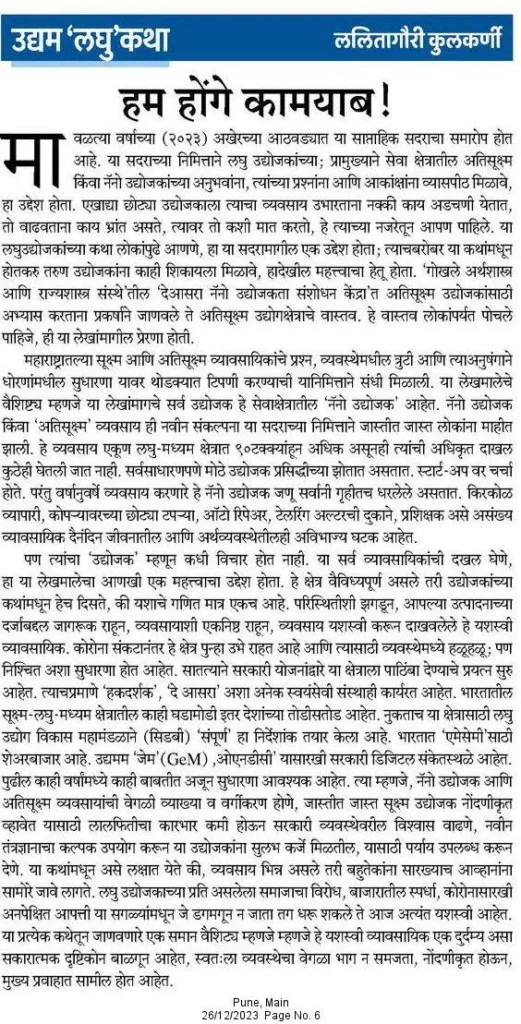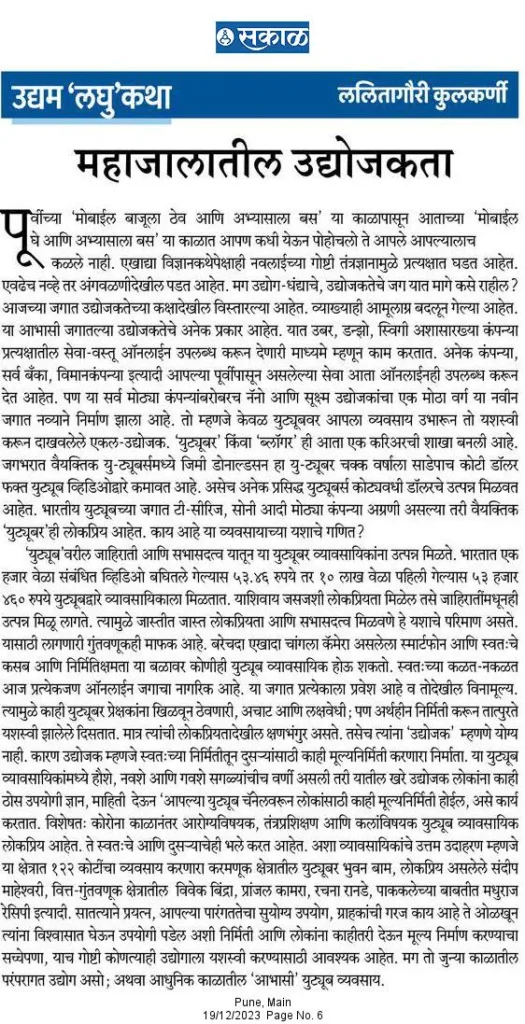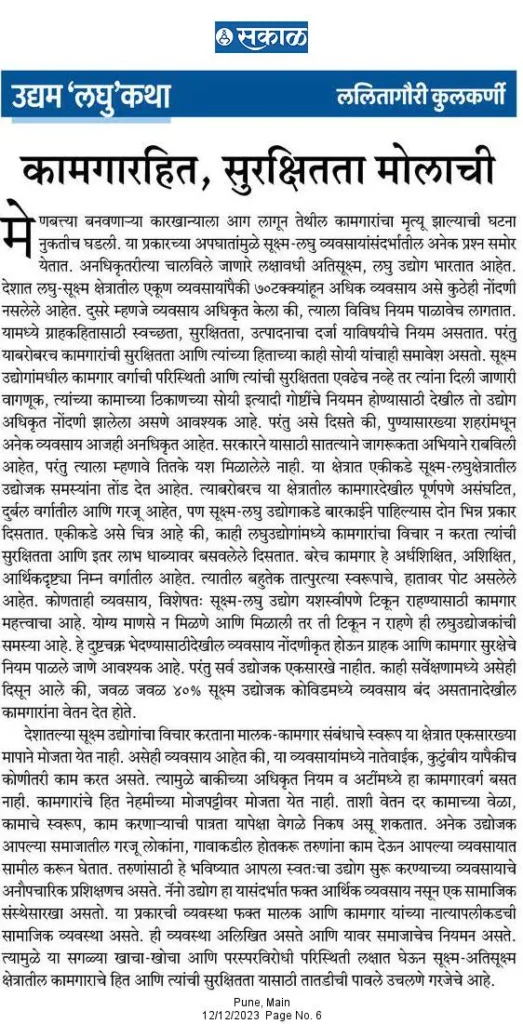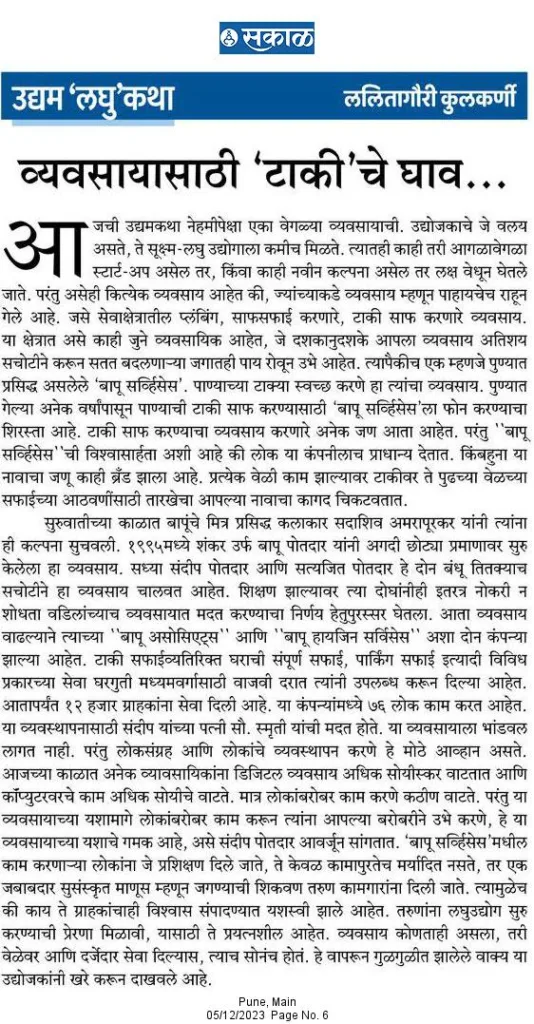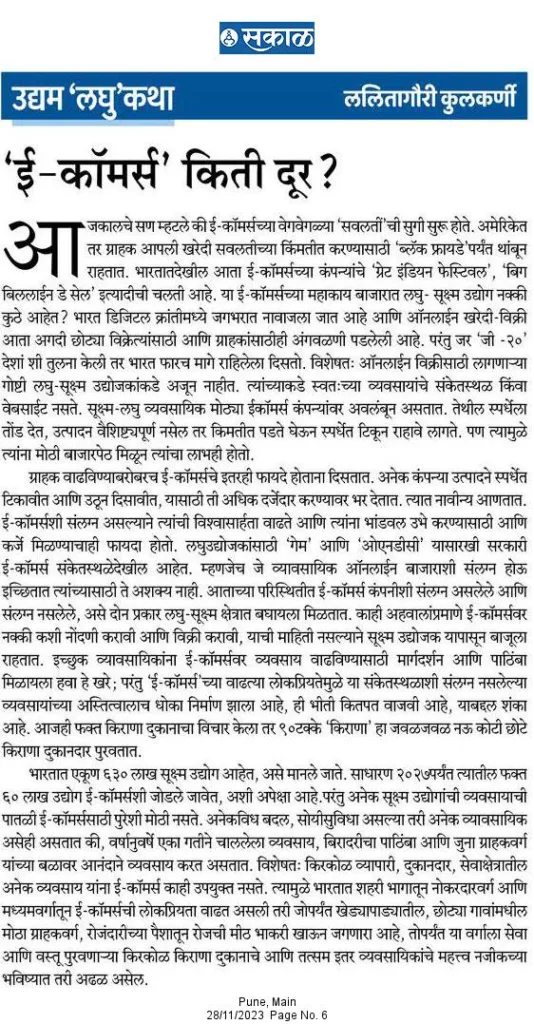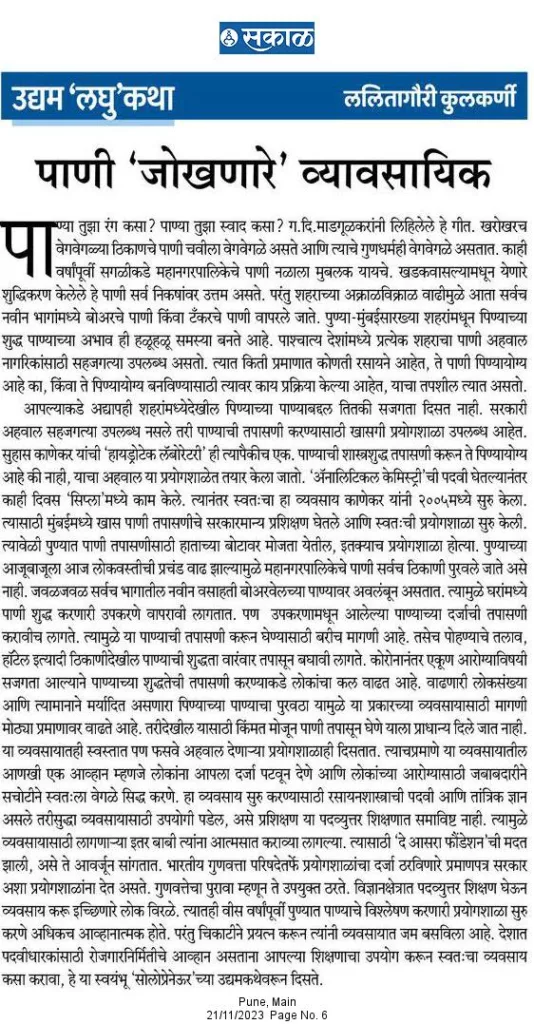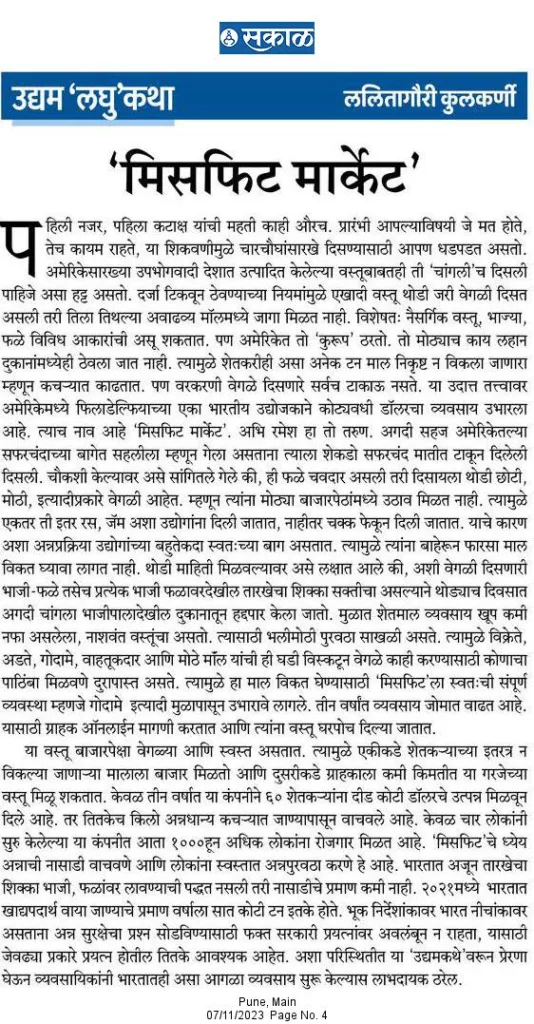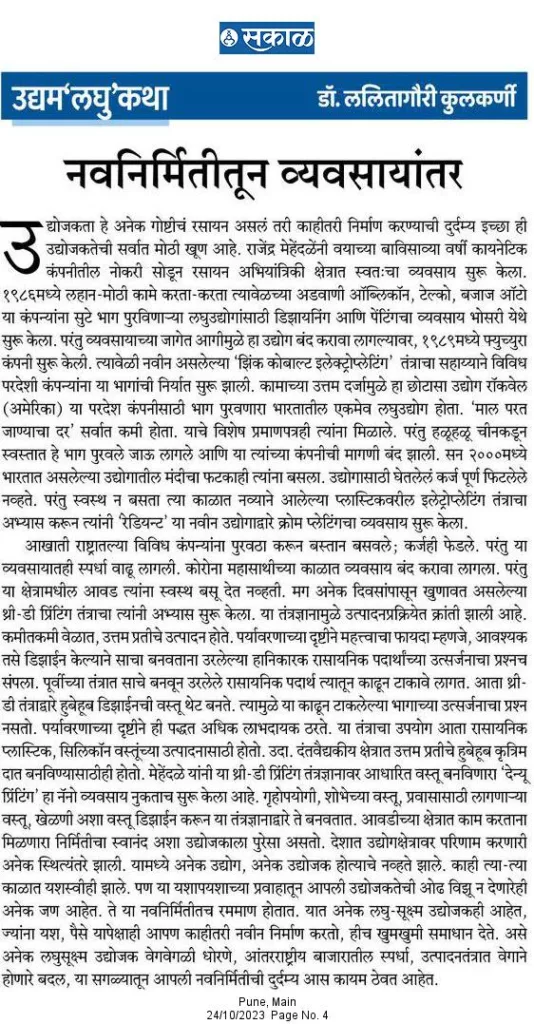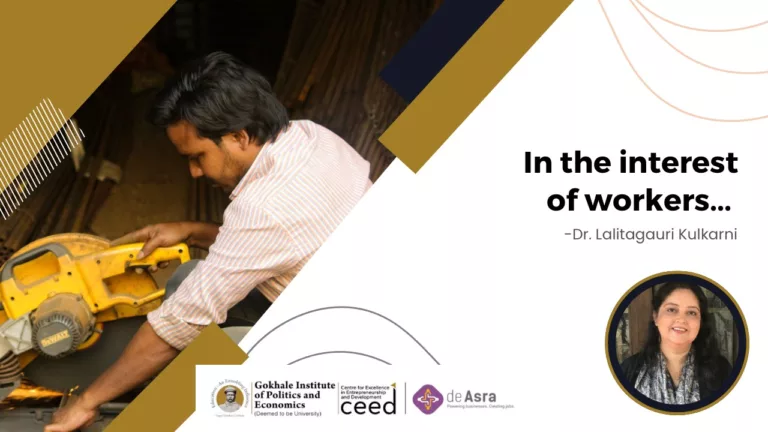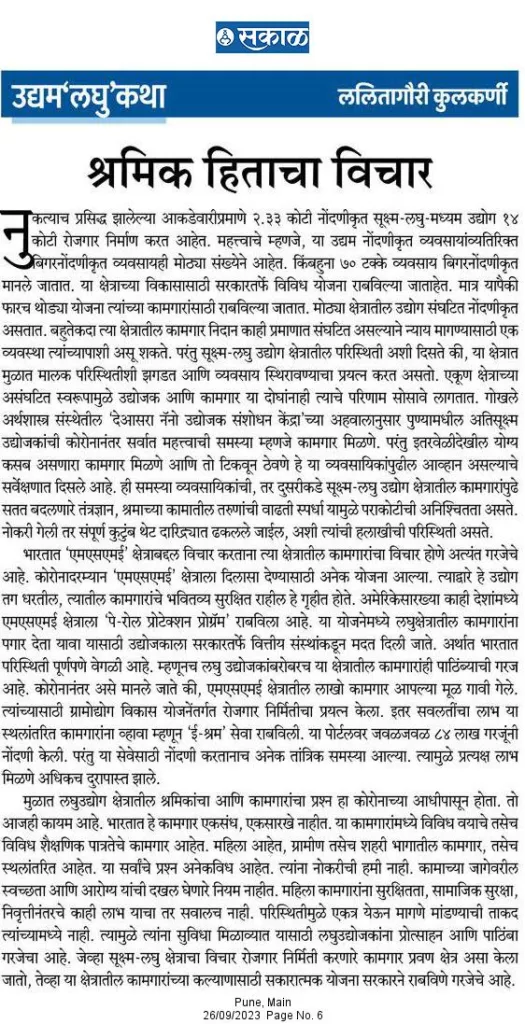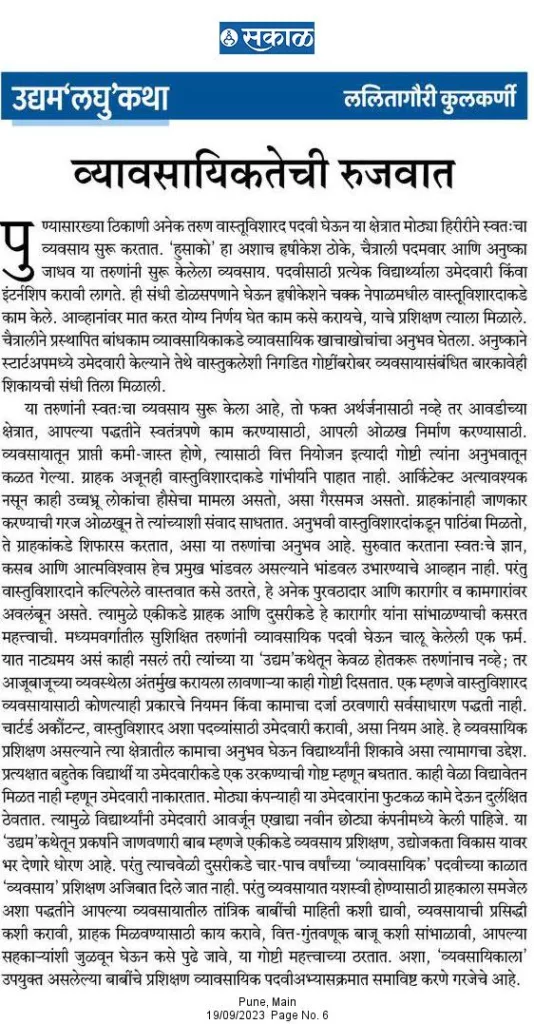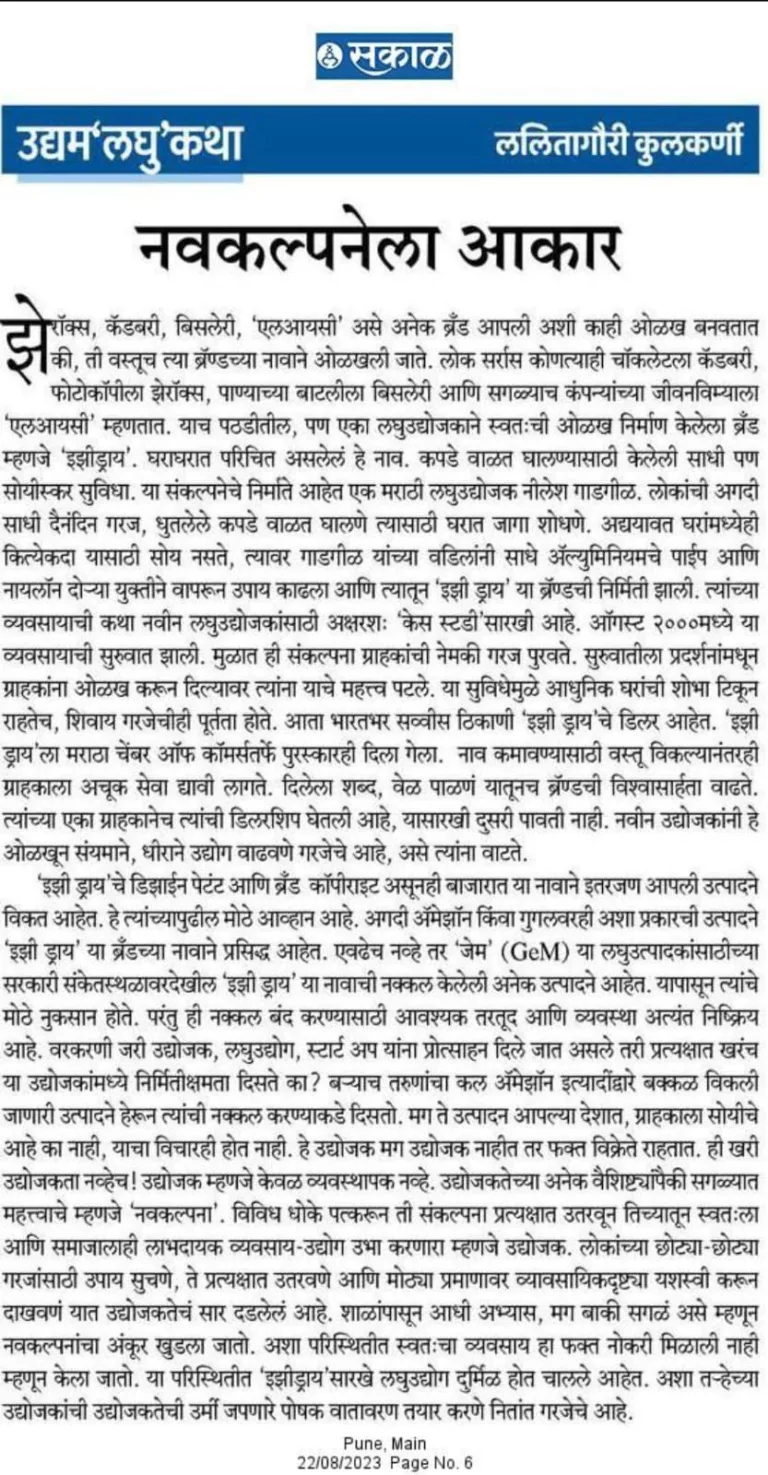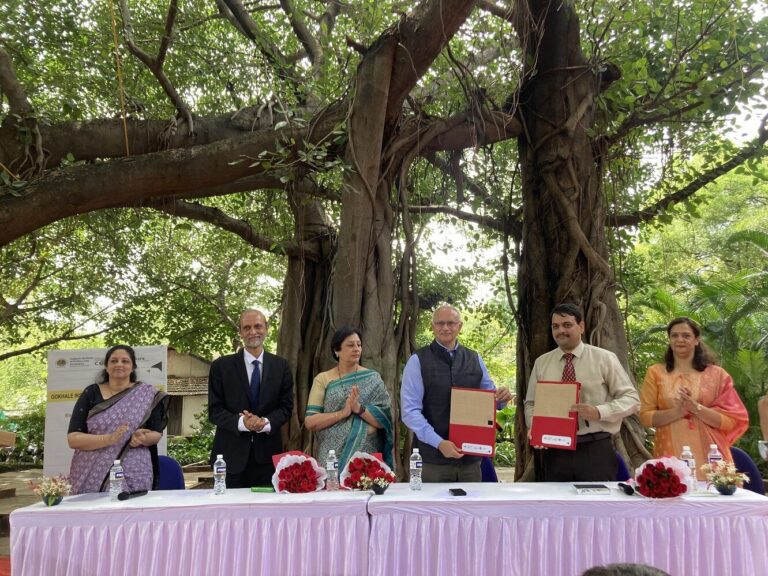Dr. Lalitagauri Kulkarni
Advocacy and outreach articles in Daily Sakal, to bring to the light the stories of struggle, striving and success of the nano entrepreneurs
We Will Succeed !
This weekly column is slated to conclude in the last week of this year – 2023. The objective of this weekly column was to address the questions and shape the aspirations of small and micro entrepreneurs. We have seen firsthand the difficulties that a small entrepreneur faces while setting up his/her enterprise. We have also witnessed how the entrepreneur beats all odds and succeeds. One of the objectives behind this weekly column was to bring the stories of these small entrepreneurs to the fore. At the same time, it was also intended to address budding young entrepreneurs. The realities of the nano enterprise sector were observed at the Centre for Excellence in Entrepreneurship & Development (CEED) & DeAsara Nano Entrepreneurship Research Centre at Gokhale Institute of Politics and Economics. The motivation behind these articles was that this reality should reach the people.
This column became an opportunity to briefly comment on the problems that micro and small entrepreneurs face in Maharashtra. Moreover, it helped to bring into spotlight the flaws in the system and the necessary reforms required. The main feature of this series of articles is that all the entrepreneurs mentioned are nano-entrepreneurs in the service sector. The novel concept of nano-entrepreneur or ‘ultra-micro’ business became known through these articles. Although these businesses constitute more than 90 percent of the total small and medium sector, their official registration is not taken anywhere. Generally, big entrepreneurs are in the limelight, start-ups are discussed but these nano entrepreneurs, who have been doing business for years, are taken for granted. Retailers, auto repair shops, tailoring and alter shops, coaches, etc. are an integral part of our daily life and the economy as well.
However, they are never thought of as entrepreneurs. Taking note of all these professionals was another important purpose of these articles. The stories of entrepreneurs show that the secret of success is the same, although the fields are diverse. These entrepreneurs have shown that by facing the problems, having faith in the quality of their product, and being loyal to the business, one can succeed. The sector is recovering after the pandemic. Meanwhile, fundamental changes are also taking place in the system, albeit at a slow pace. Continuous efforts are being taken to support this sector through government schemes. Similarly, many voluntary organizations like ‘Hakdarshak’, ‘DeAsra’ are also working in this regard. Some of the developments in the micro-small-medium sector in India are akin to other countries. Recently, the Small Industries Development Bank of India (SIDBI) prepared the ‘Sampurna’ index for this sector. There is a stock market for MSME in India. There are government digital websites like GeM, ONDC, etc. Some improvements are needed in the next few years. Separate definition and classification of nano-entrepreneurs and micro-entrepreneurs, increasing trust in the government system by reducing red tape so that maximum number of micro-entrepreneurs are registered, providing options for these entrepreneurs to get easy loans by creative use of new technology, to name a few. These stories show that although businesses are different, most of them face similar challenges. Those who were able to withstand the opposition of society, competition in the market, and unexpected calamities like the pandemic are very successful today. A common feature that emerges from each of these stories is that these successful entrepreneurs have a relentlessly positive outlook, registering and joining the mainstream rather than seeing themselves as a separate part of the system.
This article by Dr. Lalitagauri Kulkarni was originally published in Marathi in Sakal Newspaper on December 26, 2023.
Entrepreneurship in the age of Internet
We cannot ascertain how time flew from the ‘put your mobile aside and study’ era to ‘take your mobile and study’. Things stranger than science fiction are actually happening thanks to the advent in technology. Moreover, people are getting accustomed to such novel technology in no time. So how can the world of business and entrepreneurship be left behind? In today’s world, the scope of entrepreneurship has also expanded. Definitions have changed fundamentally. There are many types of entrepreneurships in this virtual world. For instance, companies like Uber, Dunzo, Swiggy act as mediums that provide actual services and goods online. Many companies, banks, airlines etc. are now making their existing services available online. But along with all these big companies, a large class of nano and micro entrepreneurs has emerged in this new world – solo entrepreneurs. Solo entrepreneurs have become successful by building their business solely on YouTube. So much so that ‘YouTuber’ or ‘Blogger’ has now become a career branch. Among the individual YouTubers in the world, Jimmy Donaldson is a YouTuber who earns almost five and a half crore dollars a year just from YouTube videos. Many such famous YouTubers are earning millions of dollars. Although big companies like T-Series, Sony etc. are the leaders in the Indian YouTube world, individual YouTubers are popular. What are the dynamics of this business?
These YouTubers earn from advertisements and premium subscriptions on YouTube. In India, if a video is viewed 1000 times, Rs. 53.46, and 10 lakh views gets Rs. 53,460 through YouTube. Apart from this, as a channel gains popularity, it also starts earning from advertisements. So, gaining maximum popularity and membership is the measure of success. The investment required for this is also modest. Most of the time, anyone can become a YouTube professional with a smartphone having a good camera and their own skills and creativity. Knowingly or unknowingly, everyone today is a citizen of the online world. Some YouTubers engage in catchy and eye-catching content; however, their success is temporal in nature. It is not appropriate to call them entrepreneurs since an entrepreneur is a creator who creates some value for others through their own creation. Especially after the pandemic, YouTube professionals in healthcare, technical training and arts have become popular. They are doing good for themselves and others. The best examples of such professionals are Bhuvan Bam, who is in the entertainment sector, Sandeep Maheshwari, Vivek Bindra (finance-investment sector), Pranjal Kamra, Rachna Ranade, Madhura’s Recipe (culinary field) etc. Constant efforts, proper use of expertise, understanding what customers need and creating something that will benefit them are the things that are essential for any business to succeed. Be it the old traditional industry or the modern-day virtual YouTube business.
This article by Dr. Lalitagauri Kulkarni was originally published in Marathi in Sakal Newspaper on December 19, 2023.
Labour Safety: The need of the hour
Recently there was an unfortunate incident where a candle factory caught fire and a few workers succumbed to their death. These types of accidents raise questions regarding micro and small businesses. There are lakhs of micro and small scale industries in India that are run informally. More than 70 percent of enterprises in this sector are unregistered. Secondly, once a business is formally registered to operate, it has to follow various rules and regulations that focus on hygiene, safety, product quality, etc. in order to protect consumers. The safety and welfare of workers is also included under such rules. In order to regulate the conditions and safety of the working class in micro-enterprises, the enterprise must be officially registered. However, many businesses from cities like Pune are still unregistered. The government has continuously implemented awareness campaigns for this, but it has achieved little success. Micro and small scale entrepreneurs face numerous problems while operating in their respective sectors. Similarly, workers are also completely unorganised. A closer look at this industry reveals two different perspectives. Some small scale enterprises neglect the safety and other benefits of the workers. Most of the workers come from semi-educated or illiterate or economically lower class backgrounds. Labour is essential for the survival of any business, especially micro and small scale enterprises. Not getting the right people and not being able to retain them is the problem that these entrepreneurs face. To break this vicious cycle, enterprises must be registered and follow consumer and worker safety regulations. But not all entrepreneurs are the same. Some surveys also showed that nearly 40% of micro-entrepreneurs were paying workers even when their business was closed due to the pandemic.
While considering micro enterprises in the country, the nature of employer-labour relationship cannot be measured uniformly in this sector. There are also businesses in which some relatives and family members of the employer work. So, this working class does not fit in the rest of the official rules and conditions. Hourly wage rates may vary depending on hours of work, nature of work and qualifications of the worker. Many entrepreneurs involve the needy people of their society or the budding youth from the village in their businesses. For the youth, it is an informal training in business to start their own enterprise in the future. Nano industry, in this respect, is not just a business but a social organisation. This type of system is a social system which is even greater than the relationship between employer and worker. This is in a way an unwritten system that is regulated by society itself. Keeping in mind all these pitfalls, urgent steps need to be taken for the welfare and safety of the workers in this sector.
This article by Dr. Lalitagauri Kulkarni was originally published in Marathi in Sakal Newspaper on December 12, 2023.
Enterprise of Tank Cleaners
This entrepreneurial story is a little different from traditional business stories. Nano and small enterprises rarely receive any entrepreneurial spirit. A novel start-up or an out of box idea gets noticed by consumers. There are many businesses that are no longer considered as a business for example, plumbing, cleaning, tank cleaning, etc. There are some entrepreneurs in this field, who have been doing their business for decades with great integrity. Of them is the famous ‘Bapu Services’ based in Pune. Their business is cleaning water tanks. Many enterprises have sprung up in the business of tank cleaning. However, the credibility of ‘Bapu Services’ is unparalleled. In fact, this name has become a brand in itself. Each time after work, they stick a paper with their name on the tank to remind the customers of future cleaning requirements.
In the early days, Mr. Bapu Potdar’s friend and famous artist, Sadashiv Amarapurkar suggested this idea. This enterprise was started in 1995 by Mr.. Shankar alias Bapu Potdar on a very small scale. It is currently being managed by Mr. Sandeep Potdar and Mr. Satyajit Potdar. After their education, both of them decided to help their father in his business. Eventually, the business grew and two companies ‘Bapu Associates’ and ‘Bapu Hygiene Services’ came into being. Along with primarily focusing on tank cleaning, the enterprise also focuses on deep cleaning, parking cleaning, etc. Moreover, these types of services are made available to the middle class households at reasonable rates. So far twelve thousand customers have been served. Over 76 individuals are employed in these firms. Mrs. Smriti, Sandeep’s wife, helps in the management of the firms. Large sum of capital is not a requisite for this type of business, but people management and creating a network of people is a big challenge. Many professionals today find digital businesses more comfortable than working with people. Mr. Sandeep Potdar opines that behind any successful business lies the ability to take people together and work in a team. In ‘Bapu Services’ the training imparted to the employees is not limited to work only, but it also focuses on imparting values and ethics. Maybe that’s why ‘Bapu Services’ was successful in gaining the trust of the customers. They are working towards inspiring the youth to start small scale enterprises. ‘Bapu Services’ epitomises the adage that timely and quality service go a long way.
This article by Dr. Lalitagauri Kulkarni was originally published in Marathi in Sakal Newspaper on December 05, 2023.
How Distant is E-Commerce?
Discounts and offers have become a part of the strategies used by e-commerce firms during festivals. In the US, consumers wait until Black Friday to shop at discounted prices. Even in India now, e-commerce companies conduct ‘Great Indian Festival’, ‘Big Billion Days Sale’ etc. Where exactly do micro and small enterprises figure out in this magnanimous market of e-commerce? India is becoming globally recognized in the digital revolution. As a result, small sellers and consumers have become accustomed to online shopping. Compared to G-20 countries, however, India seems to be far behind. Micro and small entrepreneurs do not have the prerequisites for online vending. They do not possess their own business website or online point of contact. Hence, micro and small entrepreneurs depend on e-commerce companies. In order to survive the fierce competition, quintessential to e-commerce platforms, the product is sold at lower prices. On the flipside, this is beneficial to these enterprises as they get access to bigger markets.
Aside from increasing the number of customers, e-commerce also has other benefits. Many companies focus on improving the quality of their products in order to survive and stand out in the competition. Being involved in e-commerce increases their credibility and also helps them raise capital and get loans. There are also government e-commerce websites like ‘GeM’ and ‘ONDC’ for small entrepreneurs. Thus, it is not impossible for entrepreneurs to join the online market. In the current scenario, two types of micro-enterprises are seen; viz. affiliated and non-affiliated with e-commerce companies. According to some reports, micro entrepreneurs stay away from e-commerce because they do not know exactly how to register and sell. It is true that aspiring professionals need guidance and support to grow their business on e-commerce, however the fear that the growing popularity of e-commerce threatens the very existence of businesses may be unfounded. Even today, if we consider only the grocery store, 90 percent of the grocery is supplied by nearly nine crore small grocers.
It is believed that there are a total of 630 lakh micro enterprises in India. By around 2027, 60 lakh enterprises are hoped to be connected to e-commerce platforms. But the business scale of many micro-enterprises is not large enough for e-commerce. Although there are rapid advancements in technology, many entrepreneurs are content to do business for years due to a loyal customer base, support from fraternity, etc. Especially for retailers, shopkeepers, businesses in the service sector, e-commerce is not useful. Therefore, even though e-commerce is gaining popularity in India among the working class and middle class in urban areas, there is still a huge consumer base in rural areas yet to be tapped. Hence, the importance of retail grocers and other similar businesses that provide services and goods to this class will remain unchanged even in the near future.
This article by Dr. Lalitagauri Kulkarni was originally published in Marathi in Sakal Newspaper on November 28, 2023.
Entrepreneurs Who Look After Water
‘Hey Water, what is your colour?’, ‘What is your taste like?’ These are the lyrics (translated from Marathi to English) of a song written by G. D. Madgulkar. Indeed, the taste of water changes from place to place. A few years ago, municipal water was available everywhere in Pune. Purified water from Khadakwasla is excellent on all parameters. However, because of the city’s rapid growth, new areas now use borewell or tanker water. Lack of clean drinking water has gradually become a problem in cities like Pune and Mumbai. In Western countries, every city’s water report is readily available to citizens. It gives an account of what chemicals the water contains, whether it is potable, or what kind of processes have been followed to make it potable.
In India, there is a lack of awareness about clean drinking water, even in cities. Although government reports are not readily available, private laboratories can test the purity of water. Mr Suhas Kanekar’s ‘Hydrotech Laboratory’ is one of them. A report is prepared in this laboratory after scientific examination of the water. After graduating in ‘Analytical Chemistry’, Mr Kanekar worked in Cipla for a brief stint. He started his own business in 2005. At that time, there were only a few laboratories for water testing in Pune. Due to the huge population growth in Pune, it has become increasingly difficult for the Municipal Corporation to supply water to all places. Almost all new settlements depend on borewell water. Therefore, water purification devices have to be used at homes. However, the quality of water from the purification equipment has to be checked too. Hence there is a lot of demand to test this water. People are inclined to check the purity of water due to the rise in the overall health awareness post the pandemic. Growing population and limited supply of drinking water has increased the demand for this type of product. There are labs that give cheap but disingenuous reports. Therefore, one of the major challenges that Mr Kanekar faced was convincing people about the quality of their product. Although a degree in chemistry and technical knowledge was useful for business, it did not include hands-on training. He had to inculcate new skills in order to grow his enterprise. In that regard, he has given credit to ‘DeAsra Foundation’ for guiding him in his endeavour. Upon the recommendations of the Quality Council of India, the government gives certificates to such laboratories. There are very few people who have started an enterprise after undertaking post-graduation in the field of science. Twenty years ago, starting a water analysis laboratory in Pune was a really challenging task. But with persistent efforts, Mr Kanekar managed to firmly establish his business. Finding employment opportunities for graduates in this country is an uphill task, however, this entrepreneurial story shows that one can use their education, start a novel business, and become a self-made ‘solopreneur’.
This article by Dr. Lalitagauri Kulkarni was originally published in Marathi in Sakal Newspaper on November 21, 2023.
What’s in a Name?: A ‘Brand Value’
Among all the small things that we use in our daily life, many become so habitual that without them, we feel uncomfortable using a different brand. Regular tea, special soaps for Diwali bathing, even the order of pages of and fonts of daily newspapers, etc. become so habitual that the consumer does not want to substitute them. We become attached and loyal to the image of a particular brand. One of the most important secrets of a successful business is to create a positive identity and capture it in the minds of the customers. Usually, big companies systematically cement their company’s image in the minds of consumers through advertisements. For this, the company’s logo creates its own identity by using a large system that works on colours which are published everywhere. However, small businessmen try hard to provide goods and services similar to other entrepreneurs in the market. They try to attract customers by keeping the price low. Even nano entrepreneurs can gain an edge over the competition by impressing their brand identity and quality on the minds of consumers. Nano businesses are usually concentrated in a specific area of a village or town. They are able to gain customer preference and loyalty there. As in the case of Misal in Pune, there are loyal groups like Bedekar, Katakirr etc. In many cases like pattice, vadas, tea-coffee, bread, even the usual panwala, the consumer is not easily ready to buy another product. Creating an identity and retaining customers in that area is more important than price.
In a survey conducted by Centre for Excellence in Entrepreneurship & Development along with DeAsra Centre of Excellence for nano entrepreneurship at Gokhale Institute of Politics and Economics, many entrepreneurs said that building brand awareness makes customers come back to them again. For this, they use various colours, logos, and bring a subtle yet distinctive touch to the product or service. Nano businesses make up the bulk of the market. They face high competition. But those who manage to tap into niche customer segments and create a strong brand value amongst them, survive the competition. Not only survive, but also, they further grow their business. There are many such examples in cities like Pune and Mumbai which have a cafe culture going around in the youth. New cafes have sprung up in small lanes. If you think about it closely, the cafes that have their own face, character, are the ones that are successful. Then in some places, there are ‘book cafes’ stocking books; in some places, they have become popular by encouraging customers to host shows. There have been many studies on what micro enterprises should do to create such an identity. One is to know the customer and their preferences. The second is to accordingly introduce a feature in the product or service that customers will quickly like. And lastly, one needs to continuously strive to create a distinctive identity and instil it in the mind of the customer. It is important to keep in mind that one cannot survive in the competition only by imitating others.
This article by Dr. Lalitagauri Kulkarni was originally published in Marathi in Sakal Newspaper on November 14, 2023.
Misfit Market
The importance of first impressions cannot be emphasised more. Due to this notion, we struggle to look like commoners because we believe that the opinion one forms about us in the beginning forever sticks with us. Even in a consumerist country like the United States of America, there is an insistence that a product should look good. Due to quality and standard norms, even if an item looks slightly different, it does not find a place in their supermarkets or malls. Especially natural items, like vegetables, fruits, etc. can be of different sizes. But in the US, they are considered to be ugly. Small shops and firms are not an exception to this rule either. As a result, many tons of such goods are discarded by the farmers since they become unsellable. However, not all that looks different should be discarded. Abhi Ramesh, an Indian entrepreneur from Philadelphia, has built ‘Misfit Market’, a multi-million dollar business, on this principle. While on a field trip to an apple orchard, he found hundreds of apples dumped in the soil. Upon enquiry, he was told that although these fruits were tasty, they differed in appearance by being slightly smaller/larger. Hence, they were not accepted in big markets. They were either given to other industries to make juices, jams, or were eventually thrown away. This is because such food processing industries have their own gardens, hence, they don’t have to source much goods from outside. After getting some information, it was found that even the best vegetables were expelled from the markets within a few days since the date stamp was mandatory on them. Basically, agribusiness is a very low profit enterprise dealing in perishable commodities. There is a big supply chain for that. Thus, it is difficult to break the cycle of vendors, stalls, godowns, transporters and big malls and get support from anyone to do something different. ‘Misfit Market’ had to set up its own system in order to buy such goods. In three years, their business grew rapidly.
Customers order online and the items are delivered to them at home. These items are different and cheaper than the market. So, on one hand, the farmer’s produce which cannot be sold elsewhere gets a market, and on the other hand, the consumer can get these necessities at a lower price. In just three years, this company provided 60 farmers with an income of one and a half million dollars. On the other hand, food was also saved from going to waste. Started by just four people, this company now employs more than 1000 people. Their mission is to prevent undue wastage and provide affordable food to people. In India, there is still no method of applying date stamps on vegetables and fruits, but the rate of wastage is not low. In 2021, the amount of food waste in India was 7 crore tonnes. With India at the bottom of the hunger index, addressing the issue of food security requires as much effort as possible. In such a situation, it will be beneficial if budding entrepreneurs start such a business in India by taking inspiration from this story.
This article by Dr. Lalitagauri Kulkarni was originally published in Marathi in Sakal Newspaper on November 07, 2023.
Innovation leading to Business Transformation
Although entrepreneurship is the fundamental requisite of an enterprise, the hallmark of entrepreneurship is the burning desire to create something. Mr. Rajendra Mehendale quit his job at Kinetic Company at the age of twenty-two and started his own business in the field of chemical engineering. In 1986, he started a designing and painting business in Bhosari for small scale industries supplying spare parts to the then Advani Oblicon, Telco, Bajaj Auto, etc. But after a devastating fire in the premises, he had to close the business. Thereafter, he started Futura company in 1989. With the advent of the novel Zinc-Cobalt Electroplating technique, export of small parts to various foreign companies grew by leaps and bounds. Due to the good quality of work, this small scale industry was the only one in India to supply parts to Rockwell (USA), a foreign company. The return rate of goods was the lowest. He also received a special certificate for this. But gradually these parts started being supplied at even lower rates from China and the demand for his products contracted. They were also hit by the industrial recession in India in the year 2000. The loans taken for the business were not fully repaid. Without losing hope, he started a chrome plating business called ‘Radiant’ after studying the electroplating technique on plastic which was newly introduced at that time.
Slowly, he established the presence of the company in the Gulf countries and repaid the loans. However, competition in this business also started to increase. Eventually it had to be closed during the COVID-19 pandemic. His passion, however, did not allow him to stop. He started studying the 3-D printing technique. This technology has revolutionised the manufacturing process by producing the best quality product in the least amount of time. The said manufacturing technique is also beneficial to the environment as it eliminates the issue of harmful chemicals left over from the mould making process. Since, precisely designed objects are made directly by 3-D printing technique, there is no question of emission. This technique is also used to produce chemical plastics, silicone products, etc. In the field of dentistry, it is used to make high-quality artificial teeth. Mr. Mehendale recently started a nano business called ‘Denyu Printing’ which makes items based on this 3-D printing technology. They design and manufacture home decor items, travel items, toys and more using this technology. The joy of creation while working in the field of interest is enough for such an entrepreneur. The industrial sector in the country has undergone numerous transitions. In this process, many entrepreneurs along with their enterprises could not sustain in the long run. However, there were many who did not put a stop to their entrepreneurial streak. They rejoiced in their innovation instead of just focusing on money and success. Many such small and micro entrepreneurs are still kindling their inner fire of innovation through different policies, market competition and rapid changes in production technology.
This article by Dr. Lalitagauri Kulkarni was originally published in Marathi in Sakal Newspaper on October 24, 2023.
In the interest of workers…
As per the data released recently, 2.33 crore registered micro, small and medium enterprises generate employment for 14 crore individuals. In addition to registered businesses on the Udyam portal, there are a large number of unregistered businesses. As a matter of fact, close to 70 percent of businesses are unregistered. The government has been implementing various schemes for the development of this sector. However, very few of these schemes are implemented for workers. Large sector industries are organised and registered. Workers in those sectors are somewhat organised and may have mechanisms to seek justice. But the situation in the MSME sector is different. The owner is essentially found to be struggling with stabilising the business. Due to the unorganised nature of the overall sector, both entrepreneurs and workers have to suffer the consequences. According to a report by Centre for Excellence in Entrepreneurship & Development(CEED) powered by the DeAsra foundation at Gokhale Institute of Politics and Economics, one of the most difficult problems faced by nano entrepreneurs in Pune post COVID-19 is finding workers. The survey also found that at other times, retaining workers with the right skills is a challenge for these businesses. This is a problem faced by entrepreneurs. On the other hand micro and small scale industry workers face uncertainty due to ever changing technology and increasing competition from youth in labour jobs. If they lose their job, their families are at the risk of being pushed into poverty.
When discussing the MSME sector in India, it is important to think about the workers too. During COVID-19, many schemes gave relief to the MSME sector with the motive of securing the future of workers and the overall industry. In some countries like the USA, Payroll Protection Program has been implemented for the MSME sector. In this scheme, the entrepreneur is given help by the financial institution. However, there is a stark difference in India. Therefore, along with the small entrepreneurs, the workers in this sector also need support. After COVID-19, lakhs of workers in the MSME sector went to their hometowns. Efforts were made to create employment for them under Gramodyog Vikas Yojana. ‘E-Shram’ service was implemented to enable these migrant workers to benefit from other concessions. Almost 84 lakh individuals registered on this portal. But there were many technical problems while registering for this service. This proved to be an impediment in getting benefits.
Such issues were faced by workers of small scale industries even before the pandemic and are persistent to this day. These workers comprise various age groups and educational qualifications. There are women, rural and urban workers, as well as migrants. The questions of all these are aplenty. They are not guaranteed a job. There are no rules regarding hygiene and health at the workplace. There is no question of safety, social security, post-retirement benefits for women workers. Due to this, they do not have the means to come together and raise their demands. Therefore, small entrepreneurs need encouragement and support so that they can access facilities. Since this is considered as a labour intensive sector that generates employment, it is necessary for the government to implement positive schemes for the welfare of the workers.
This article by Dr. Lalitagauri Kulkarni was originally published in Marathi in Sakal Newspaper on September 26, 2023.
Seeds of Entrepreneurship
In cities like Pune, many young individuals start their own business in the field of architecture after obtaining a degree. Husaco is a firm started by Hrishikesh Thoke, Chaitrali Padamwar and Anushka Jadhav. It is imperative for students to do candidacy or internship in order to obtain a degree. Grabbing this opportunity, Hrishikesh worked for an architect in Nepal. He was trained in how to overcome challenges and make the right decisions. Chaitrali gained professional experience during her stint with an established builder. Anushka’s candidature at a startup gave her the opportunity to learn the nuances of a business.
These young people have started their own business with the goal of not just to earn money, but to work independently in their field of interest, in their own way, and create their identity. They learnt about the fluctuations in revenue, financial planning etc. from experience. It is observed that clients don’t take architects seriously. The reason is a common misconception that architects are just of interest to the elites and are not essential. Young people like Hrishikesh, Chaitrali and Anushka get support from experienced architects, who recommend them to clients. There is no challenge in raising capital since one’s own knowledge, skills and confidence are one of the most valuable assets during establishment of a business. However, suppliers, craftsmen, and workers determine how an architect’s vision turns into reality. So, it is important to take care of the customer on one hand and the artisan on the other hand. The firm was established by well-educated middle-class youngsters. There is no dramatic element in this story. However, their entrepreneurial story is definitely something that makes you think and also questions the existing ecosystem of entrepreneurship. The architectural profession lacks any form of regulation or general practice that determines the quality of work. There is a rule that students should apply for candidacy titles as Chartered Accountant, Architect. As this is vocational training, the aim is for students to learn through work experience in that field. In fact, most of the students look at this candidature as an afterthought. Sometimes they reject the candidature because they don’t get a stipend. Even big companies ignore these candidates by giving them mediocre jobs. Hence, it is advisable that students apply in a small company. One can conclude that, business training fosters entrepreneurship development. However, at the same time, no business training is given at all during the four-five year professional degree. In order to succeed in business, emphasis should be laid on communication with customers, publicity, managing of business finance, and most importantly, team work. Thus, such training in subjects useful to an individual should be included in the professional degree curriculum.
This article by Dr. Lalitagauri Kulkarni was originally published in Marathi in Sakaal Newspaper on 19th Sep 2023.
Navigating the Branding Battlefield: Unveiling the challenges faced by Innovative Small Businesses
Many brands like Xerox, Cadbury, Bisleri, LIC, etc. create their identity in such a way that the product itself is known by the name of that brand. People generally call any chocolate as Cadbury, photocopy as Xerox, water bottle as Bisleri and all life insurance companies as LIC. “Easy Dry”, created by an entrepreneur, is a brand that falls in the same category. This brand is a household name because of its simple and convenient facility for drying clothes. Mr Nilesh Gadgil, a Marathi entrepreneur, is the creator of this concept. Finding a place in the house for drying washed clothes is a daily necessity of the people. Even modern houses often do not have facilities for this. Identifying this necessity, Mr Gadgil’s father found a solution by using simple aluminium pipes and nylon ropes. This led to the inception of the brand, “Easy Dry”. His business story is a case study for small budding entrepreneurs. This business started in August 2000. Basically, this concept caters to the exact need of the customers. Initially, after introducing it through exhibitions, customers realised its importance. This facility not only preserves the beauty of modern homes but also fulfils the needs. Now there are dealers of “Easy Dry” in twenty six locations across India. “Easy Dry” was also awarded by the Mahratta Chamber of Commerce. In order to earn a name, one has to provide good service to the customer even after selling the product. The trust in a brand increases only by keeping the given word and time. Mr Gadgil feels that it is necessary for new entrepreneurs to recognize this and grow their enterprise with patience.
Despite the design patent and brand copyright of “Easy Dry”, others are selling their products under the same name in the market. This is a big challenge for them. Even on Amazon or Google, such products are famous under the brand name “Easy Dry”. Not only this, the government website for small entrepreneurs ‘GEM’ (GeM) also has many fake products with the name “Easy Dry”. They undergo losses due to this forgery. Also, the necessary provision and arrangement to stop this duplication is very passive. Even though entrepreneurs, small industries, start-ups are encouraged, in reality, do these entrepreneurs really show creativity? A lot of young entrepreneurs tend to spy and copy products that are sold on platforms like Amazon. There is no thought given whether that product is convenient for the customer in our country or not. These entrepreneurs are not entrepreneurs but only sellers. This is not true entrepreneurship. An entrepreneur is not just a manager. Among the many characteristics of entrepreneurship, the most important is ‘innovation’. An entrepreneur is one who takes risks and sets up a business-enterprise that benefits not only themself but also the society at large. The essence of entrepreneurship lies in coming up with solutions for people’s small needs, implementing them and making them commercially successful on a large scale. New ideas, innovations are often stymied upon right from school. Due to this, people undertake new enterprises only because no jobs are available. In this situation, small scale industries like “EasyDry” are becoming increasingly rare. It is imperative to create a nurturing environment that preserves the entrepreneurial spirit of such entrepreneurs.
This article by Dr. Lalitagauri Kulkarni was originally published in Marathi in Sakaal Newspaper on 22nd Aug 2023.
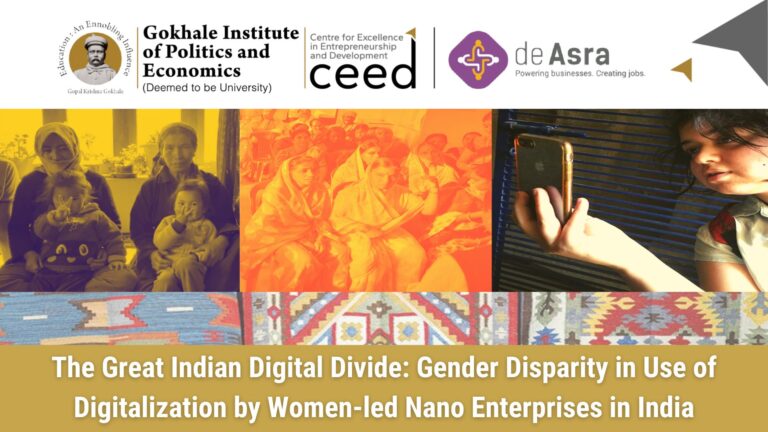
On-demand session by the CEED research team at the Financial Inclusion Week 2022 by the Centre for Financial Inclusion and ACCION
Centre to study entrepreneurship development set up at Gokhale Institute – Indian Express
The Centre for Excellence in Entrepreneurship and Development will primarily undertake research, policy analysis and recommendations for the growth of entrepreneurship.
Pune-based Gokhale Institute of Politics and Economics (GIPE) has established a new centre for research on entrepreneurship.
The Centre for Excellence in Entrepreneurship and Development (CEED) is a joint venture between GIPE, Persistent Systems and deAsraFoundation and the three parties inked a memorandum of understanding (MoU) on Thursday.
Read the full article here: https://indianexpress.com/article/cities/pune/pune-centre-to-study-entrepreneurship-development-set-up-at-gokhale-institute-8112623/
Faculty seminar by Ms. Rashmi Bansal on “Challenges faced by Micro entrepreneurs in Today’s Environment”
deAsra Centre of Excellence in Nano entrepreneurship has been established
deAsra Centre of Excellence in Nano entrepreneurship has been established with the MoU signed between Mr. Anand Deshpande, Founder and Chairman of Persistent Systems and founder of deAsra Foundation and Gokhale Institute of Politics and Economics. This memorable event organized under the historic Banyan tree at Gokhale Institute marked the beginning of a promising academic endeavor.

